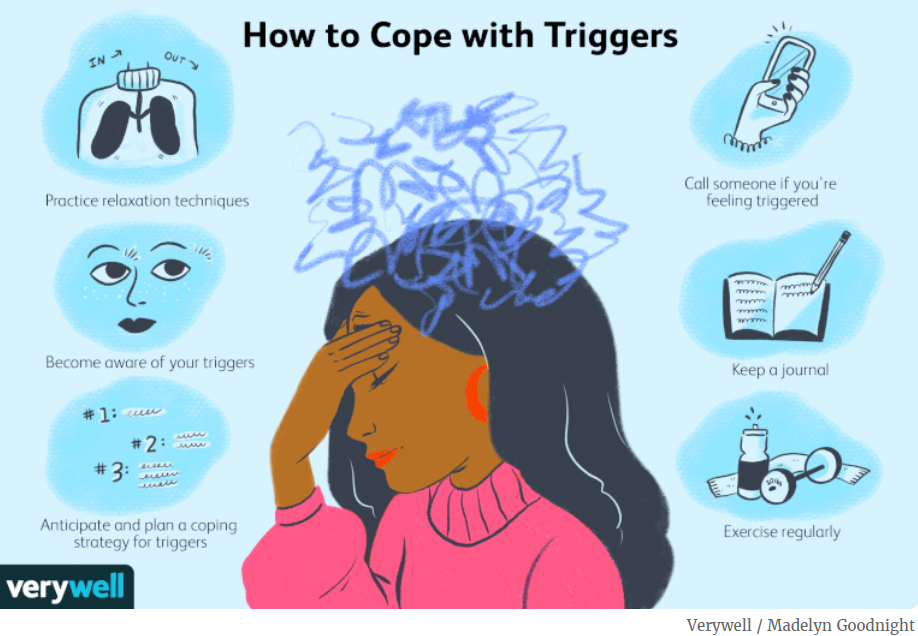
You’ve probably heard someone use the word trigger.
What does being triggered mean and how can we recognize when we have been triggered?
I will let you in on a little secret. I am triggered easily and often. I have to stop myself on countless occasions to reassess the situation, take a deep breath, and think before I speak.
We can be triggered by many different scenarios. I can be doing just fine and see something on social media and feel triggered by jealousy, or envy, or anger, or frustration. I can remember something and be triggered into feeling deep sadness and depression.
For me, I’d say my biggest trigger is doing something new that I’ve never done before. I have a fear-based mentality from a childhood of unpredictability. I have to have a plan, a way out, a backup plan, and a what-if plan for everything I do. My fear and anxiety go over the top and I realize my brain is not being rational.
I try to think about what a normal person might be thinking or feeling at this moment. I don’t downplay the emotion. I acknowledge that my body feels there is an imminent threat or danger, and tell myself I am calm and I am safe.
It is okay to try new things. If I didn’t walk through fear, I would never try anything new because I’m scared of most everything.
I am hard to live with because I overthink everything. I am constantly triple-checking to make sure everything is in its place, we haven’t forgotten anything, and that the door is locked and the oven is off for the umpteenth time.
It comes from a place of hypervigilance. It makes me feel like I am out of control when I haven’t triple-checked everything.
But here’s the good news about that. I have learned that it’s just one of my character traits. My family knows I’m a little neurotic about some things and we can laugh about it. I can stay calm.
I used to feel more panicky and out of control, but now that I know this is who I am, I can easily accept this about myself and move forward.
I also have learned to give myself some grace if I’m especially spazzy about doing something that scares me. I know, for me, when I’m nervous or worried, I will clean obsessively. Just knowing that helps me realize that this is something I commonly do, so if I’m in a frantic cleaning frenzy, I can ask myself what am I so worried about and try to calm myself down by breathing and maybe doing some stretches or taking a walk outside.
When I try something new, I get anxious, but instead of trying to stay cool, I admit to myself that I am nervous to try this new thing. I am anxious about messing up, not knowing where to go, or how it will go. I might lose sleep the night before, I probably won’t have an appetite, and I will definitely get sweaty and be in the bathroom a lot before we go.
I have come to know that I can risk vulnerability and say I’m pretty nervous about this. I can stop and pray and ask for guidance. I don’t have to walk alone.
I can repeat a mantra like—I can stay calm, cool, and collected in any situation.
Having kids can also be a trigger, in general. Kids are their own people and do a lot of irritating things that we can’t control. Kids know how to push our buttons, especially when they become tweens and teens.
I get annoyed when my son leaves his dishes in the living room and his socks on the floor.
Another huge trigger for me is when he or I lose something. Losing an item sends me into a tailspin looking for it, retracing steps, and spiraling downward until I remember it is just a material item. It will come up and if not, it is okay.
I am triggered quickly by angry people and it creates a fight or flight response in me.
What I’ve learned is it’s best if I don’t react right away. Easier said than done, I know. If something is really bothering me, I take the time to write or talk about it to help clear my head.
I have learned over the years that if I don’t do something physical every day for my body, my brain doesn’t function as well. As soon as I’ve done 30 minutes of walking or yoga, my brain gets rewired and I can think again from a more sane perspective.
Here are some tips below to help when you become triggered:
>> Practice relaxation techniques.
>> Become aware of your triggers.
>> Anticipate and plan a coping strategy for triggers.
>> Call someone if you’re feeling triggered.
>> Keep a journal.
>> Exercise regularly.

Photo credit: verywellmind
Being triggered is a popular term to use light-heartedly, but for people with PTSD, triggers are very real. The more aware we can be about ourselves and our behaviors, the better those around us can learn how to help us when we need it. When we are alone and triggered, we learn to name our feelings and reroute our brain, talk about what’s going on inside, and not have a trigger derail us for the whole day. We can easily assess it and come back to reality without causing more damage to the situation—whatever it may be.
What are some common triggers for you and how do you cope with them? Have you learned to manage and live with your triggers? I would love to know.
~








Read 41 comments and reply